forked from crawlab-team/crawlab
-
Notifications
You must be signed in to change notification settings - Fork 0
/
README.md
281 lines (198 loc) · 13.2 KB
/
README.md
1
2
3
4
5
6
7
8
9
10
11
12
13
14
15
16
17
18
19
20
21
22
23
24
25
26
27
28
29
30
31
32
33
34
35
36
37
38
39
40
41
42
43
44
45
46
47
48
49
50
51
52
53
54
55
56
57
58
59
60
61
62
63
64
65
66
67
68
69
70
71
72
73
74
75
76
77
78
79
80
81
82
83
84
85
86
87
88
89
90
91
92
93
94
95
96
97
98
99
100
101
102
103
104
105
106
107
108
109
110
111
112
113
114
115
116
117
118
119
120
121
122
123
124
125
126
127
128
129
130
131
132
133
134
135
136
137
138
139
140
141
142
143
144
145
146
147
148
149
150
151
152
153
154
155
156
157
158
159
160
161
162
163
164
165
166
167
168
169
170
171
172
173
174
175
176
177
178
179
180
181
182
183
184
185
186
187
188
189
190
191
192
193
194
195
196
197
198
199
200
201
202
203
204
205
206
207
208
209
210
211
212
213
214
215
216
217
218
219
220
221
222
223
224
225
226
227
228
229
230
231
232
233
234
235
236
237
238
239
240
241
242
243
244
245
246
247
248
249
250
251
252
253
254
255
256
257
258
259
260
261
262
263
264
265
266
267
268
269
270
271
272
273
274
275
276
277
278
279
280
281
# Crawlab
<p>
<a href="https://github.com/crawlab-team/crawlab/actions/workflows/dockerpush.yml" target="_blank">
<img src="https://github.com/crawlab-team/crawlab/actions/workflows/dockerpush.yml/badge.svg">
</a>
<a href="https://hub.docker.com/r/tikazyq/crawlab" target="_blank">
<img src="https://img.shields.io/docker/pulls/tikazyq/crawlab?label=pulls&logo=docker">
</a>
<a href="https://github.com/crawlab-team/crawlab/releases" target="_blank">
<img src="https://img.shields.io/github/release/crawlab-team/crawlab.svg?logo=github">
</a>
<a href="https://github.com/crawlab-team/crawlab/commits/master" target="_blank">
<img src="https://img.shields.io/github/last-commit/crawlab-team/crawlab.svg">
</a>
<a href="https://github.com/crawlab-team/crawlab/issues?q=is%3Aissue+is%3Aopen+label%3Abug" target="_blank">
<img src="https://img.shields.io/github/issues/crawlab-team/crawlab/bug.svg?label=bugs&color=red">
</a>
<a href="https://github.com/crawlab-team/crawlab/issues?q=is%3Aissue+is%3Aopen+label%3Aenhancement" target="_blank">
<img src="https://img.shields.io/github/issues/crawlab-team/crawlab/enhancement.svg?label=enhancements&color=cyan">
</a>
<a href="https://github.com/crawlab-team/crawlab/blob/master/LICENSE" target="_blank">
<img src="https://img.shields.io/github/license/crawlab-team/crawlab.svg">
</a>
</p>
[中文](https://github.com/crawlab-team/crawlab/blob/master/README-zh.md) | English
[Installation](#installation) | [Run](#run) | [Screenshot](#screenshot) | [Architecture](#architecture) | [Integration](#integration-with-other-frameworks) | [Compare](#comparison-with-other-frameworks) | [Community & Sponsorship](#community--sponsorship) | [CHANGELOG](https://github.com/crawlab-team/crawlab/blob/master/CHANGELOG.md) | [Disclaimer](https://github.com/crawlab-team/crawlab/blob/master/DISCLAIMER.md)
Golang-based distributed web crawler management platform, supporting various languages including Python, NodeJS, Go, Java, PHP and various web crawler frameworks including Scrapy, Puppeteer, Selenium.
[Demo](https://demo-pro.crawlab.cn) | [Documentation](https://docs.crawlab.cn) | [Documentation (v0.6-beta)](http://docs-next.crawlab.cn)
## Installation
Three methods:
1. [Docker](http://docs.crawlab.cn/en/Installation/Docker.html) (Recommended)
2. [Direct Deploy](http://docs.crawlab.cn/en/Installation/Direct.html) (Check Internal Kernel)
3. [Kubernetes](http://docs.crawlab.cn/en/Installation/Kubernetes.html) (Multi-Node Deployment)
### Pre-requisite (Docker)
- Docker 18.03+
- MongoDB 3.6+
- Docker Compose 1.24+ (optional but recommended)
### Pre-requisite (Direct Deploy)
- Go 1.15+
- Node 12.20+
- MongoDB 3.6+
- [SeaweedFS](https://github.com/chrislusf/seaweedfs) 2.59+
## Quick Start
Please open the command line prompt and execute the command below. Make sure you have installed `docker-compose` in advance.
```bash
git clone https://github.com/crawlab-team/examples
cd examples/docker/basic
docker-compose up -d
```
Next, you can look into the `docker-compose.yml` (with detailed config params) and the [Documentation (Chinese)](http://docs.crawlab.cn) for further information.
## Run
### Docker
Please use `docker-compose` to one-click to start up. By doing so, you don't even have to configure MongoDB database. Create a file named `docker-compose.yml` and input the code below.
```yaml
version: '3.3'
services:
master:
image: crawlabteam/crawlab:latest
container_name: crawlab_example_master
environment:
CRAWLAB_NODE_MASTER: "Y"
CRAWLAB_MONGO_HOST: "mongo"
volumes:
- "./.crawlab/master:/root/.crawlab"
ports:
- "8080:8080"
depends_on:
- mongo
worker01:
image: crawlabteam/crawlab:latest
container_name: crawlab_example_worker01
environment:
CRAWLAB_NODE_MASTER: "N"
CRAWLAB_GRPC_ADDRESS: "master"
CRAWLAB_FS_FILER_URL: "http://master:8080/api/filer"
volumes:
- "./.crawlab/worker01:/root/.crawlab"
depends_on:
- master
worker02:
image: crawlabteam/crawlab:latest
container_name: crawlab_example_worker02
environment:
CRAWLAB_NODE_MASTER: "N"
CRAWLAB_GRPC_ADDRESS: "master"
CRAWLAB_FS_FILER_URL: "http://master:8080/api/filer"
volumes:
- "./.crawlab/worker02:/root/.crawlab"
depends_on:
- master
mongo:
image: mongo:latest
container_name: crawlab_example_mongo
restart: always
```
Then execute the command below, and Crawlab Master and Worker Nodes + MongoDB will start up. Open the browser and enter `http://localhost:8080` to see the UI interface.
```bash
docker-compose up -d
```
For Docker Deployment details, please refer to [relevant documentation](https://tikazyq.github.io/crawlab-docs/Installation/Docker.html).
## Screenshot
#### Login

#### Home Page
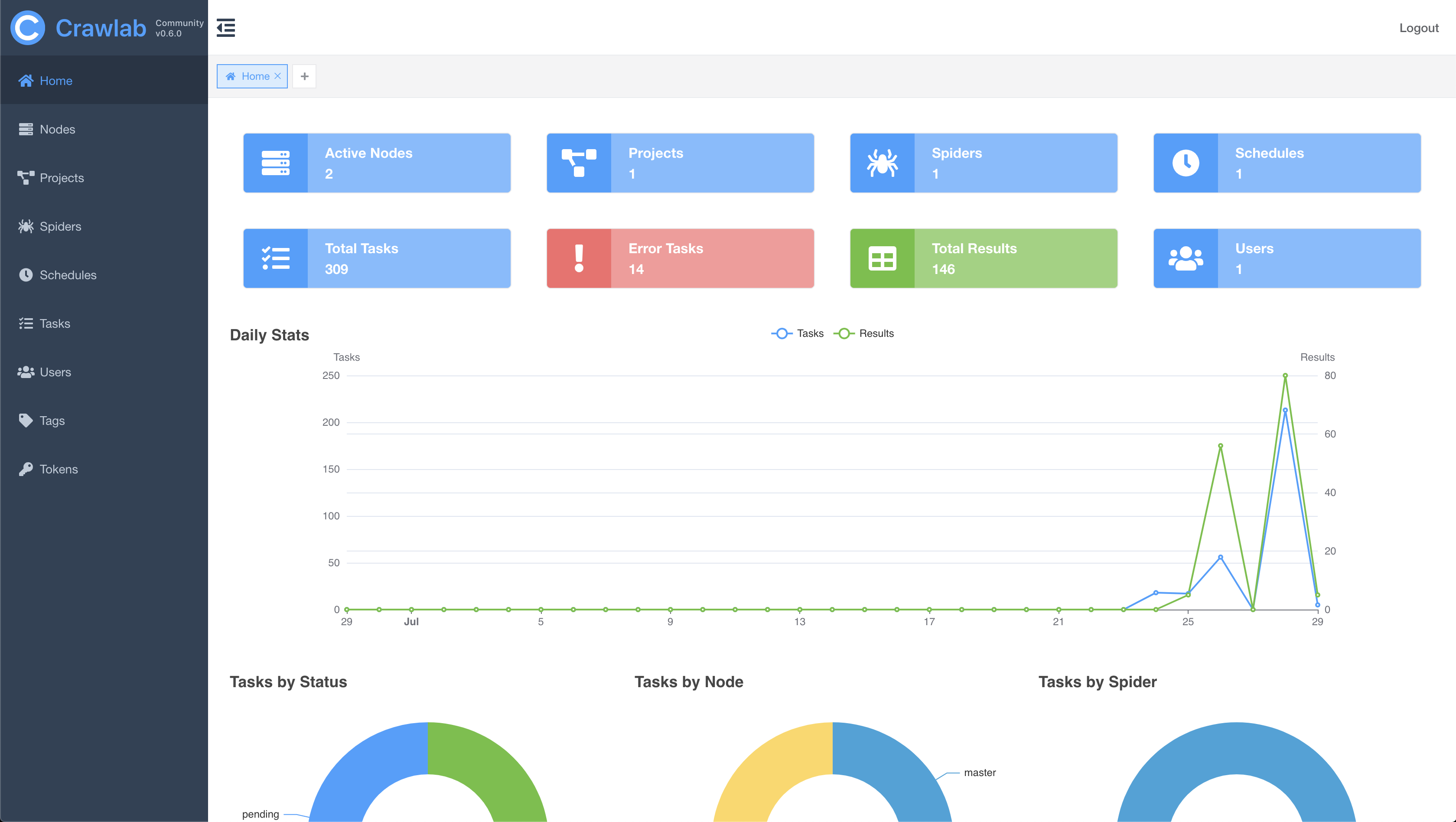
#### Node List
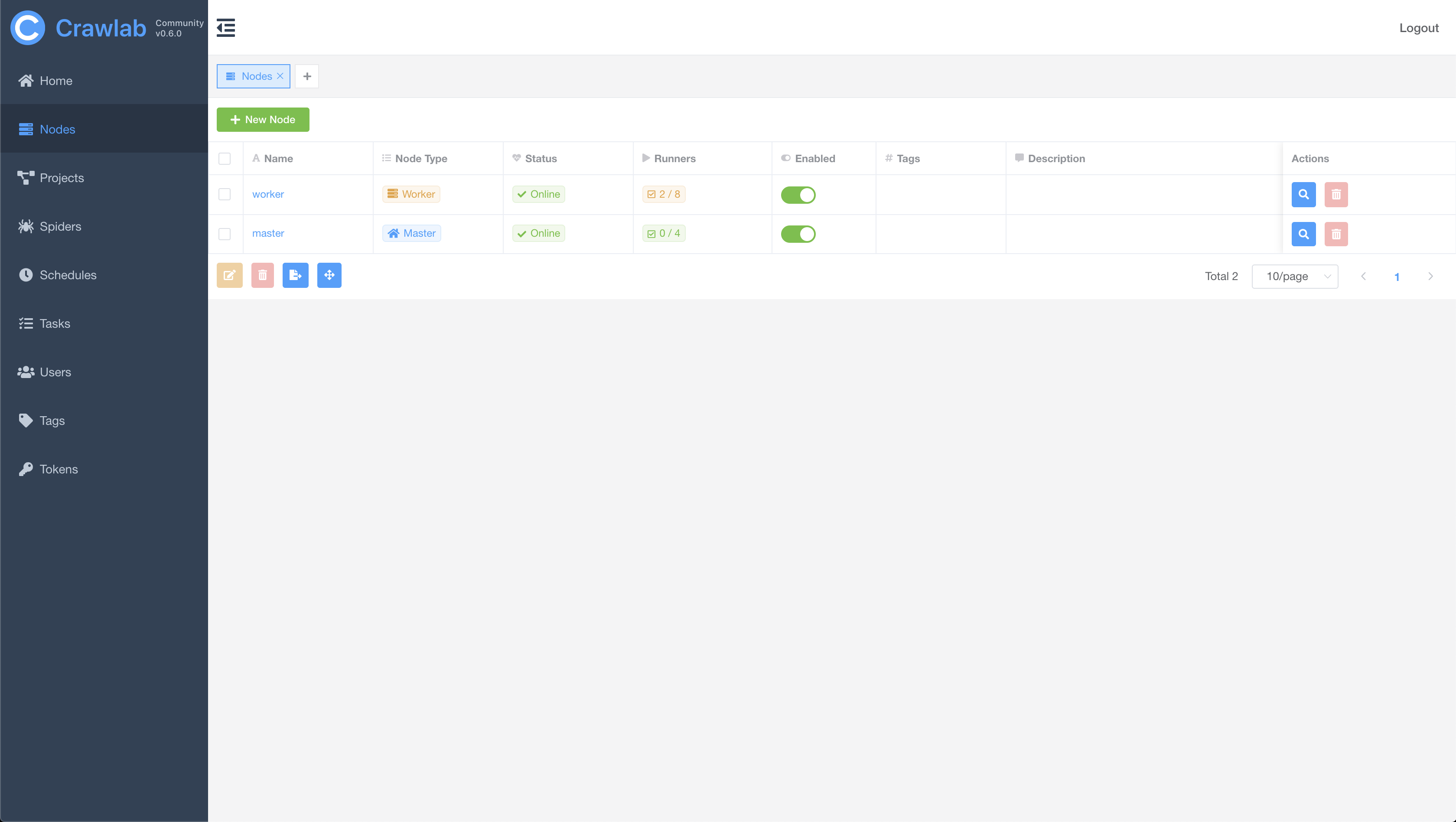
#### Spider List

#### Spider Overview

#### Spider Files
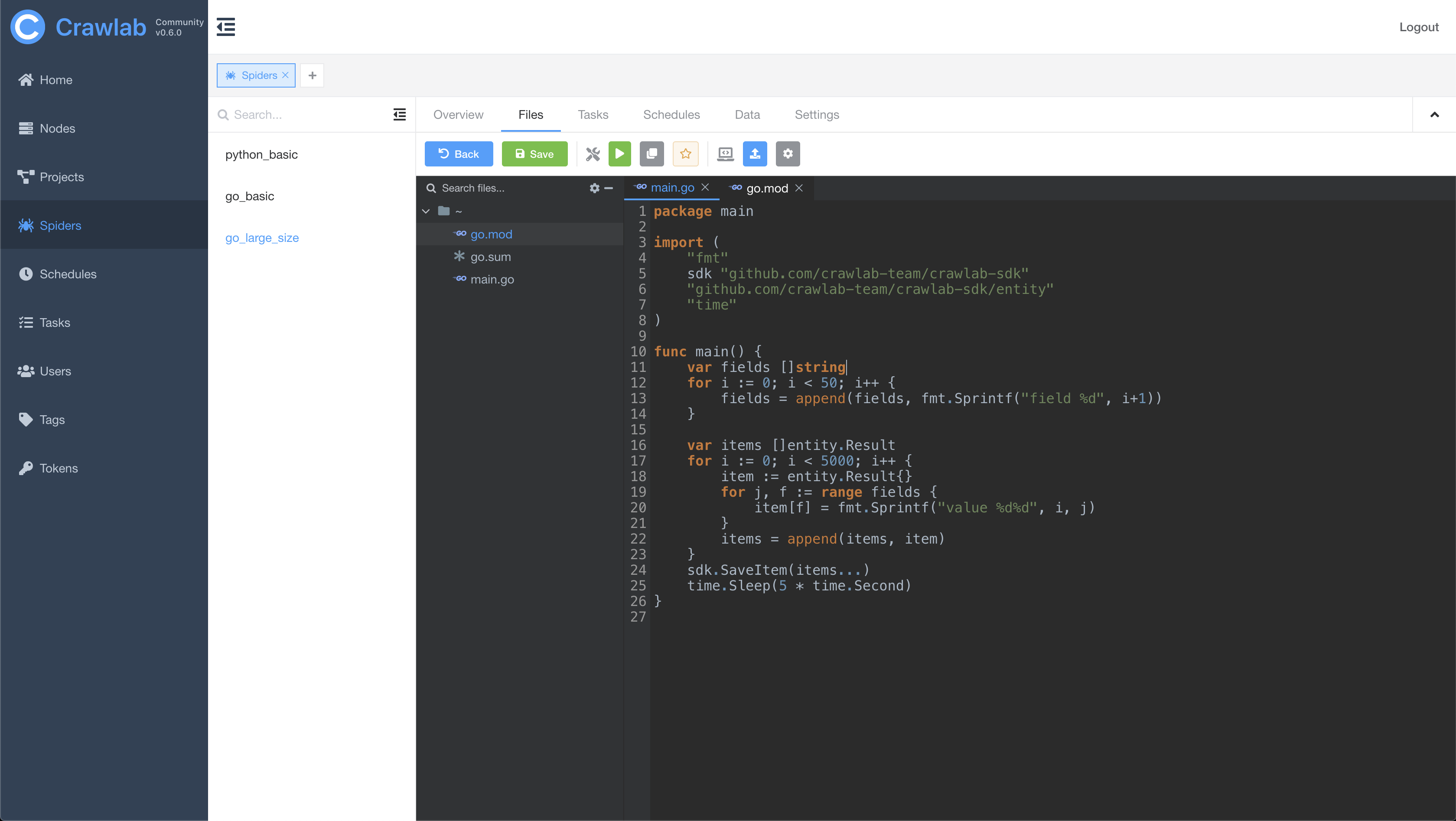
#### Task Log
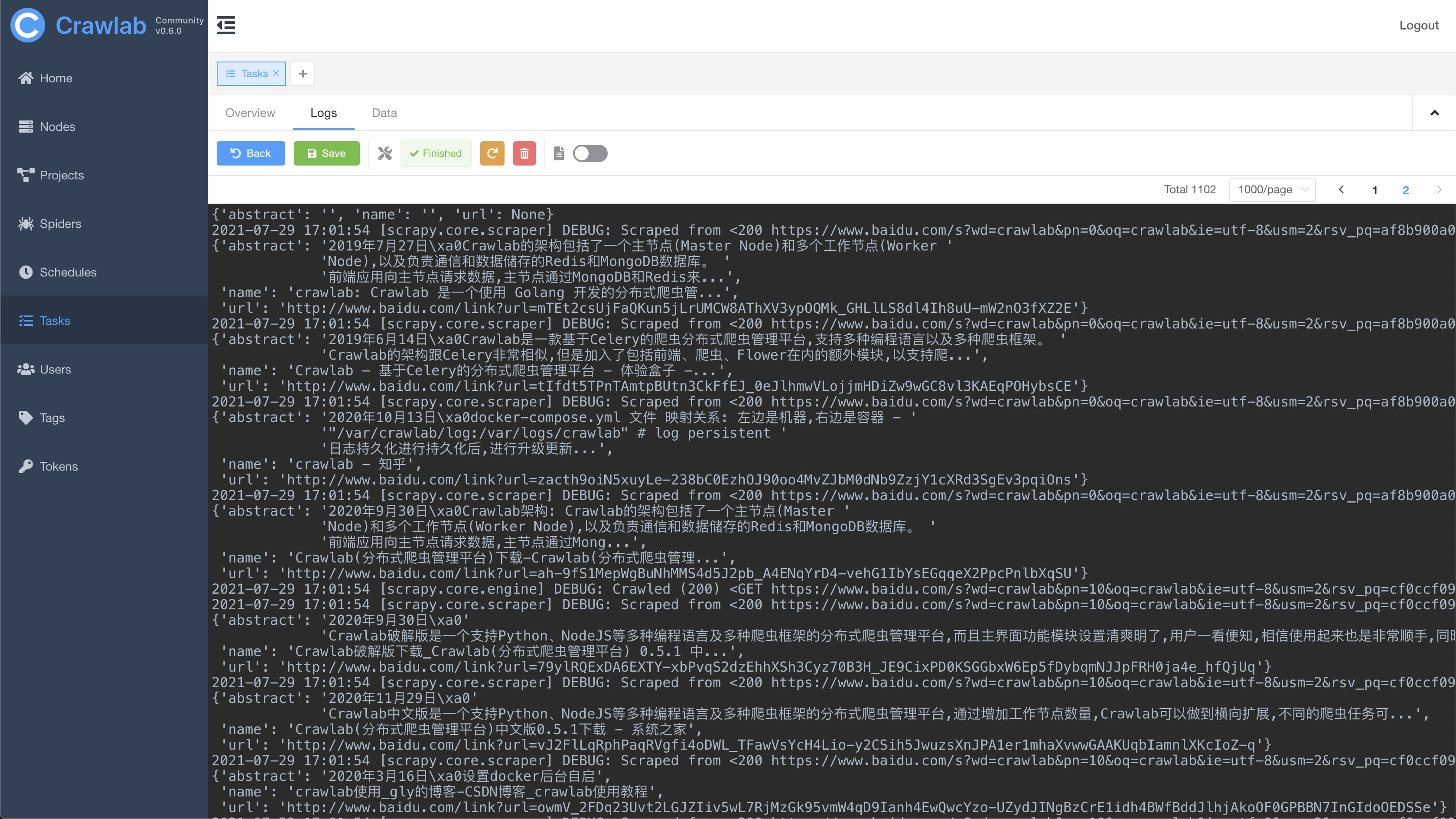
#### Task Results
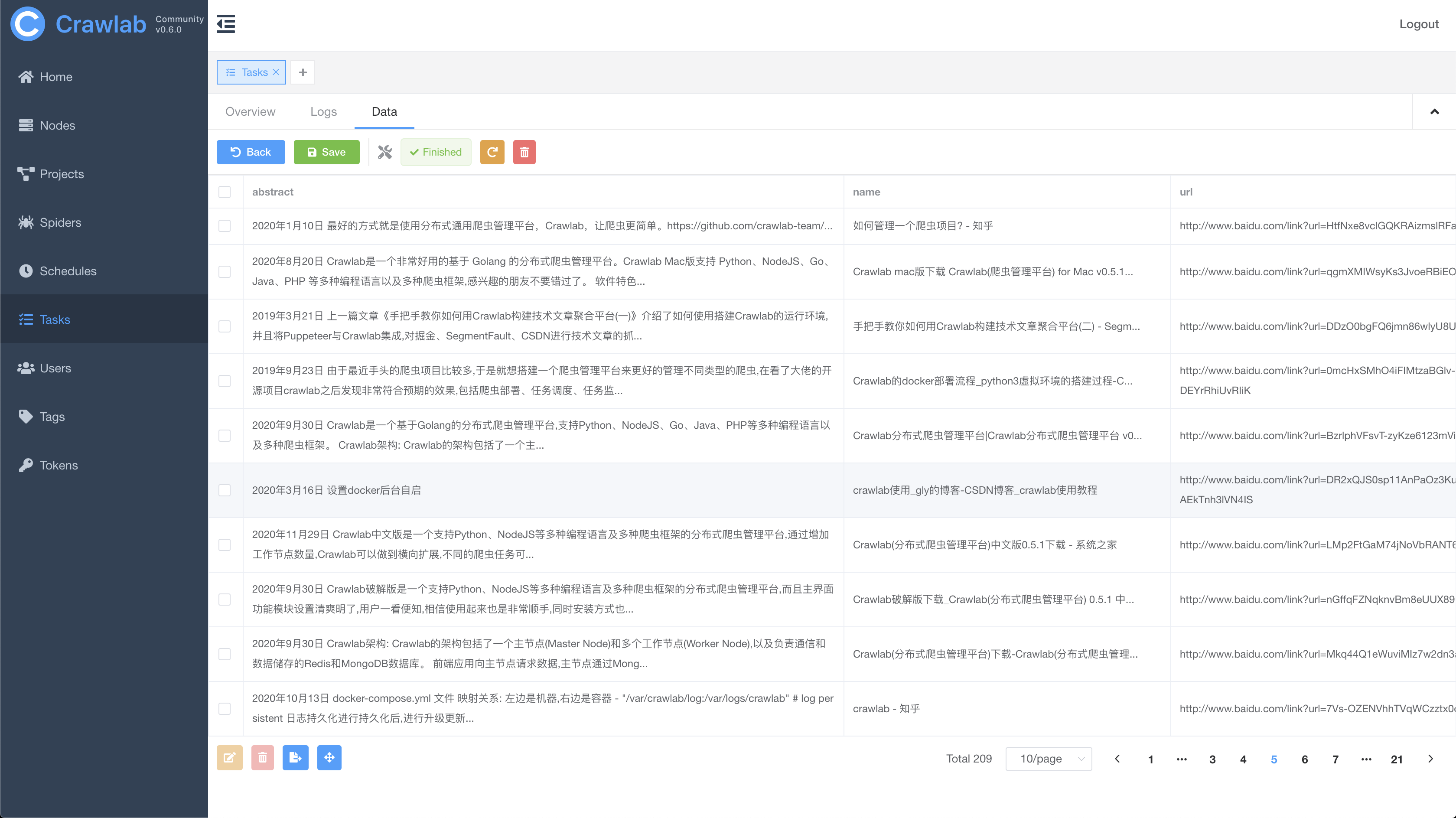
#### Cron Job
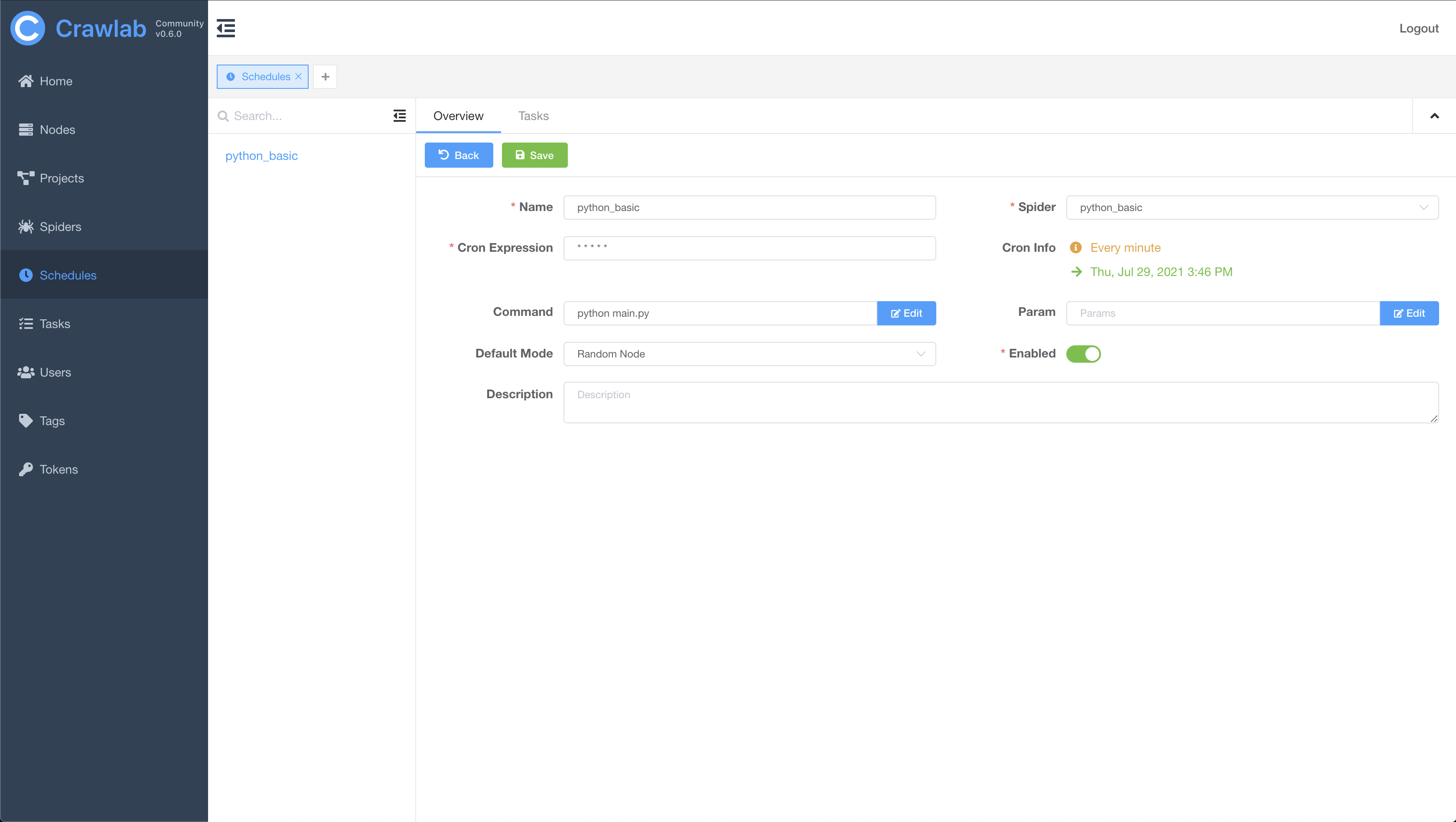
## Architecture
The architecture of Crawlab is consisted of a master node, worker nodes, [SeaweedFS](https://github.com/chrislusf/seaweedfs) (a distributed file system) and MongoDB database.
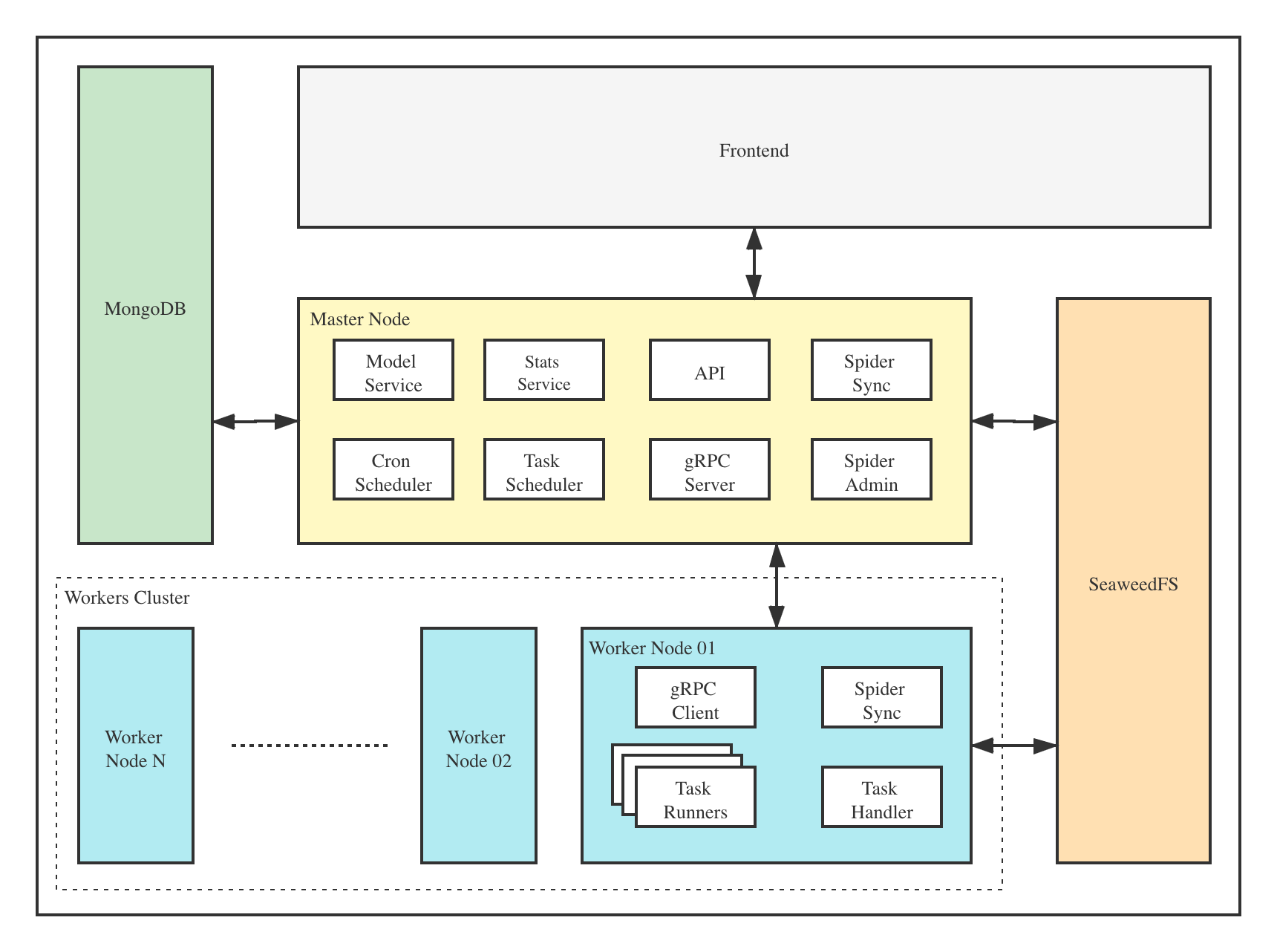
The frontend app interacts with the master node, which communicates with other components such as MongoDB, SeaweedFS and worker nodes. Master node and worker nodes communicate with each other via [gRPC](https://grpc.io) (a RPC framework). Tasks are scheduled by the task scheduler module in the master node, and received by the task handler module in worker nodes, which executes these tasks in task runners. Task runners are actually processes running spider or crawler programs, and can also send data through gRPC (integrated in SDK) to other data sources, e.g. MongoDB.
### Master Node
The Master Node is the core of the Crawlab architecture. It is the center control system of Crawlab.
The Master Node provides below services:
1. Task Scheduling;
2. Worker Node Management and Communication;
3. Spider Deployment;
4. Frontend and API Services;
5. Task Execution (you can regard the Master Node as a Worker Node)
The Master Node communicates with the frontend app, and send crawling tasks to Worker Nodes. In the mean time, the Master Node uploads (deploys) spiders to the distributed file system SeaweedFS, for synchronization by worker nodes.
### Worker Node
The main functionality of the Worker Nodes is to execute crawling tasks and store results and logs, and communicate with the Master Node through gRPC. By increasing the number of Worker Nodes, Crawlab can scale horizontally, and different crawling tasks can be assigned to different nodes to execute.
### MongoDB
MongoDB is the operational database of Crawlab. It stores data of nodes, spiders, tasks, schedules, etc. Task queue is also stored in MongoDB.
### SeaweedFS
SeaweedFS is an open source distributed file system authored by [Chris Lu](https://github.com/chrislusf). It can robustly store and share files across a distributed system. In Crawlab, SeaweedFS mainly plays the role as file synchronization system and the place where task log files are stored.
### Frontend
Frontend app is built upon [Element-Plus](https://github.com/element-plus/element-plus), a popular [Vue 3](https://github.com/vuejs/vue-next)-based UI framework. It interacts with API hosted on the Master Node, and indirectly controls Worker Nodes.
## Integration with Other Frameworks
[Crawlab SDK](https://github.com/crawlab-team/crawlab-sdk) provides some `helper` methods to make it easier for you to integrate your spiders into Crawlab, e.g. saving results.
### Scrapy
In `settings.py` in your Scrapy project, find the variable named `ITEM_PIPELINES` (a `dict` variable). Add content below.
```python
ITEM_PIPELINES = {
'crawlab.scrapy.pipelines.CrawlabPipeline': 888,
}
```
Then, start the Scrapy spider. After it's done, you should be able to see scraped results in **Task Detail -> Data**
### General Python Spider
Please add below content to your spider files to save results.
```python
# import result saving method
from crawlab import save_item
# this is a result record, must be dict type
result = {'name': 'crawlab'}
# call result saving method
save_item(result)
```
Then, start the spider. After it's done, you should be able to see scraped results in **Task Detail -> Data**
### Other Frameworks / Languages
A crawling task is actually executed through a shell command. The Task ID will be passed to the crawling task process in the form of environment variable named `CRAWLAB_TASK_ID`. By doing so, the data can be related to a task.
## Comparison with Other Frameworks
There are existing spider management frameworks. So why use Crawlab?
The reason is that most of the existing platforms are depending on Scrapyd, which limits the choice only within python and scrapy. Surely scrapy is a great web crawl framework, but it cannot do everything.
Crawlab is easy to use, general enough to adapt spiders in any language and any framework. It has also a beautiful frontend interface for users to manage spiders much more easily.
|Framework | Technology | Pros | Cons | Github Stats |
|:---|:---|:---|-----| :---- |
| [Crawlab](https://github.com/crawlab-team/crawlab) | Golang + Vue|Not limited to Scrapy, available for all programming languages and frameworks. Beautiful UI interface. Naturally support distributed spiders. Support spider management, task management, cron job, result export, analytics, notifications, configurable spiders, online code editor, etc.|Not yet support spider versioning|   |
| [ScrapydWeb](https://github.com/my8100/scrapydweb) | Python Flask + Vue|Beautiful UI interface, built-in Scrapy log parser, stats and graphs for task execution, support node management, cron job, mail notification, mobile. Full-feature spider management platform.|Not support spiders other than Scrapy. Limited performance because of Python Flask backend.|   |
| [Gerapy](https://github.com/Gerapy/Gerapy) | Python Django + Vue|Gerapy is built by web crawler guru [Germey Cui](https://github.com/Germey). Simple installation and deployment. Beautiful UI interface. Support node management, code edit, configurable crawl rules, etc.|Again not support spiders other than Scrapy. A lot of bugs based on user feedback in v1.0. Look forward to improvement in v2.0|   |
| [SpiderKeeper](https://github.com/DormyMo/SpiderKeeper) | Python Flask|Open-source Scrapyhub. Concise and simple UI interface. Support cron job.|Perhaps too simplified, not support pagination, not support node management, not support spiders other than Scrapy.|   |
## Contributors
<a href="https://github.com/tikazyq">
<img src="https://avatars3.githubusercontent.com/u/3393101?s=460&v=4" height="80">
</a>
<a href="https://github.com/wo10378931">
<img src="https://avatars2.githubusercontent.com/u/8297691?s=460&v=4" height="80">
</a>
<a href="https://github.com/yaziming">
<img src="https://avatars2.githubusercontent.com/u/54052849?s=460&v=4" height="80">
</a>
<a href="https://github.com/hantmac">
<img src="https://avatars2.githubusercontent.com/u/7600925?s=460&v=4" height="80">
</a>
<a href="https://github.com/duanbin0414">
<img src="https://avatars3.githubusercontent.com/u/50389867?s=460&v=4" height="80">
</a>
<a href="https://github.com/zkqiang">
<img src="https://avatars3.githubusercontent.com/u/32983588?s=460&u=83082ddc0a3020279374b94cce70f1aebb220b3d&v=4" height="80">
</a>
## Community & Sponsorship
If you feel Crawlab could benefit your daily work or your company, please add the author's Wechat account noting "Crawlab" to enter the discussion group. Or you scan the Alipay QR code below to give us a reward to upgrade our teamwork software or buy a coffee.
<p align="center">
<img src="https://crawlab.oss-cn-hangzhou.aliyuncs.com/gitbook/qrcode.png" height="360">
<img src="https://crawlab.oss-cn-hangzhou.aliyuncs.com/gitbook/payment.jpg" height="360">
</p>